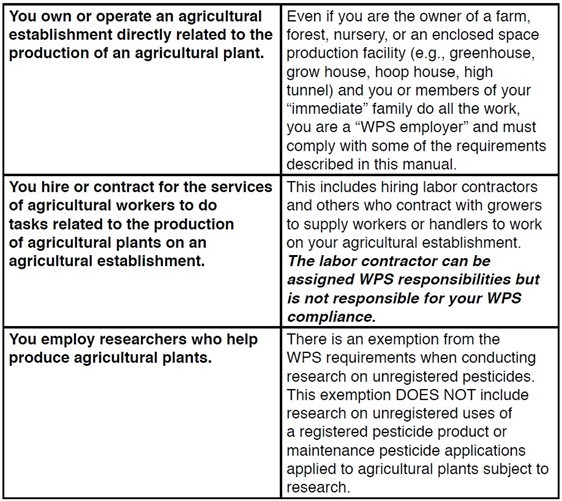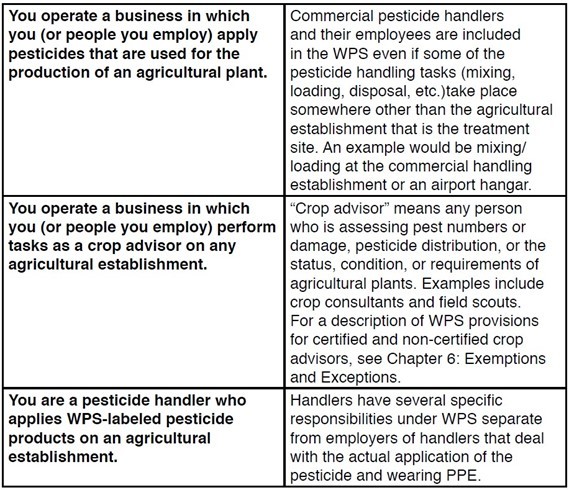Introduction to Worker Protection Standard
Katelyn Miller, Field Crops and Forage Specialist
Southwest New York Dairy, Livestock and Field Crops Program
The Worker Protection Standard (WPS) is a regulation originally issued by the U.S. Environmental Protection Agency (EPA) in 1992. It covers pesticides used in the production of agricultural plants on farms, forests, nurseries, and greenhouses. The WPS requires employers (agricultural and commercial pesticide handlers) to provide specific information and protections to workers, handlers, and other persons when WPS labeled pesticide products are used in the production of agricultural plants. It's intended to reduce the risk of injury and illness resulting from pesticide exposures on agricultural establishments.
Based on the WPS How to Comply Manual, the WPS applies to you if:


Knowing if you fall under WPS is important, but there are also some definitions that are crucial to understanding when it applies.
Agricultural Plants are plants grown and maintained for commercial or research purposes. Examples include food, feed, fiber plants, seedlings, tress, etcetera.
A worker is anyone who is employed for compensation (including self-employed) and performs tasks like harvesting, pruning, weeding, or watering in the production of agricultural plants.
A handler is anyone who is employed for compensation (including self-employed). They perform tasks such as mixing, loading, or applying pesticides; assisting in pesticide applications; cleaning, repairing, or adjusting spray equipment, or acting as a flagger. A person is not a handler if they only handle pesticide containers that have never been opened or have been emptied and cleaned according to instructions on the pesticide product labeling.
A crop advisor is any person who assesses pest numbers, damage, pesticide distribution, or the status or requirements of agricultural plants.
Other Persons include nonworkers, family members, customers, government officials, and any bystanders.
To determine if you fall under the Worker Protection Standard, or need more information on how to comply, check out the WPS How to Comply Manual at https://www.pesticideresources.org/migrated/wps/htc/htcmanual.pdf, or contact your local DEC office.
DEC Region 8 Regional Headquarters in Avon: 585-226-2466
DEC Region 9 Regional Headquarters in Buffalo: 716-851-7200
WPS How to Comply Manual (pdf; 2415KB)
Upcoming Events
Crops, Cows & Critters - Southwest New York Dairy, Livestock & Field Crops Newsletter Sponsorship
December 19, 2025
Our two forms of publications feature research-based and timely information from our four specialists, listed to the right, along with local event notifications and Cornell University outreach. This information is provided to participants who range from dairy, livestock, and field crops producers to agricultural suppliers and consultants.
Weekly Email Update: Shared with 625+ households who have signed up with our program.
Monthly Paper Mailer: To reach our stakeholders and farmers who lack internet access, we send out a monthly mailer where your company's logo and contact information would be featured with a mailing list of 330+ households.
If you sponsor our weekly and monthly publications you reach approximately 955 households.
Visit our website to view our newsletters!
2025 Cornell Food Beverage & Animal Feed Manufacturer Survey
December 19, 2025
Industry and Educational Advocates for New York State's Food, Beverage, and Animal Feed Manufacturing industries:
As you know, NYS has a diverse food and beverage manufacturing industry, in both the types of industries that exist and the wide distribution of firms by scale. Many manufacturing firms have strong backward linkages to agricultural production sectors in the state that support both farm-level and downstream food industry firms and consumers. In collaboration with the New York State Department of Agriculture and Markets, a team from Cornell University's Charles H. Dyson School of Applied Economics and Management has recently rolled out the 2025 New York State Food, Beverage, and Animal Feed Manufacturer Survey. The industry will benefit from an updated assessment of the industry that informs private and public investments and opportunities to support firm growth and improved profitability.
Boots in the Barn: Cornell Dairy Research Updates
January 13, 2026
January 20, 2026
January 27, 2026
February 3, 2026
February 10, 2026
February 17, 2026
February 24, 2026
Join us for some or all!
Announcements
No announcements at this time.





